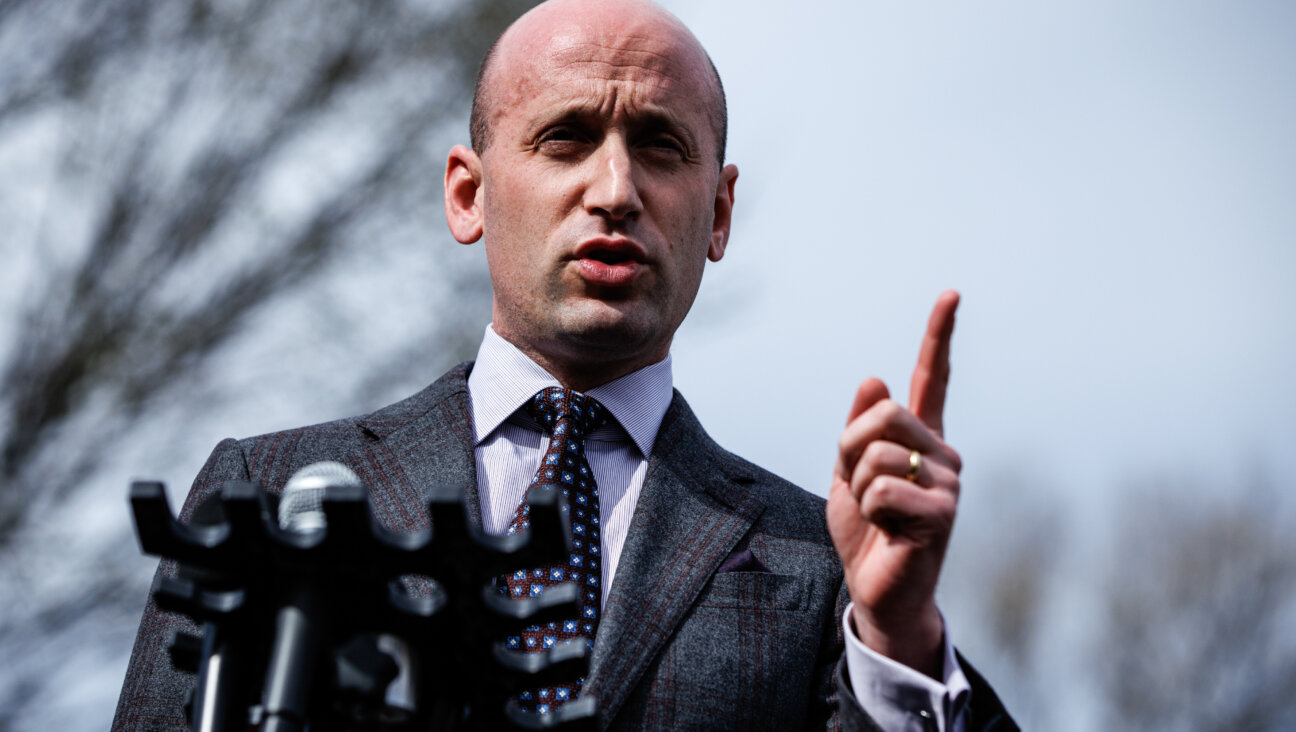Wooing the Jewish Vote
Representative Steve Cohen, a Tennessee Democrat, is in trouble again. One of Tennessee’s most liberal politicians, he represents a mostly black district in Memphis. Since he first ran for Congress in 2006, he’s faced periodic murmuring that the district should have a black representative, as it had for 30 years. In early February, however, the murmurs turned up a notch when fliers were mailed to homes in Memphis, attacking Cohen for being Jewish.
“Memphis Congressman Steve Cohen and the JEWS HATE Jesus,” the flier read. It called on “the black leaders of Memphis to see to it that one and ONLY one black Christian faces this opponent of Christ and Christianity in the 2008 election.” It was signed by the Rev. George Brooks of Murfreesboro, halfway across the state near Nashville.
Cohen contacted a Georgia-based group that researches hate groups to learn about Brooks’s background before acting. On February 11, the Atlanta office of the Anti-Defamation League released a statement condemning the flier. That day the flap first appeared in the media when the Commercial Appeal, Memphis’s main daily, reported online about the ADL denunciation. Rev. Brooks confirmed to the paper that he had sent out the flier.
The Commercial Appeal also contacted Cohen’s current primary opponent, attorney Nikki Tinker, who is black. Tinker was not available, but her spokesman, asked if Tinker was involved in the flier, told the paper: “Oh, my God; are you kidding me? Are you even calling me asking that? This is an absurd question. Of course we wouldn’t have anything to do with that.”
The spokesman added that this call was the “first we’ve even heard of it, ” the Commercial Appeal reported. Told of the ADL’s statement, the spokesman said, “We’d be interested in denouncing this sort of nonsense as well but, again, we haven’t seen it.”
Two days later, the Commercial Appeal slammed Tinker for “declining” to condemn the flier. “The question goes to the character of the woman who wants to represent the 9th District,” the paper editorialized, “and 9th District voters deserve an answer. But Tinker declined to return a phone call about the flier.” The editorial quickly became part of the larger story, quoted in nearly every new account from the Washington Post to the Jewish Telegraphic Agency.
The very next day, the Associated Press reached Tinker, who “said she was incensed by the anti-Semitic attack,” the AP reported. “My faith,” she was quoted as saying, “teaches me to love, not hate.”
But the AP story was hardly noticed. A week later, news sites around the country were still receiving angry messages from readers incensed at Tinker’s “refusal” to speak out. Several Jewish bloggers argued that the flier must be the Tinker campaign’s doing, despite the clear trail back to Murfreesboro. Some black readers speculated that it was all a Cohen campaign plan to discredit Tinker with a false charge of antisemitism.
One reader posted a message on the JTA site that set the record straight, quoting Tinker’s AP comments. But there was no change in the headline, “Rep.’s foe won’t slam ‘hate Jesus’ flier,” which still shows up prominently in a Google news search for the Cohen story.
We could have devoted this editorial to the persistence of anti-Semitism. That certainly would have served an important purpose; Jew-hatred is on the rise in some unexpected circles, and it demands a response.
Or we could have explored the parallels between Cohen, successfully representing a mostly-black district in Memphis, and Barack Obama, seeking to lead the people of the United States. We could have waxed optimistic about the end of racism and bigotry in America.
Both of those messages are proper and timely. Our lesson today, however, is about something more painful: the power and potential for abuse in the accusation of antisemitism, and the difficulty of undoing the damage. Case in point: Nikki Tinker, evidently an innocent bystander, unfairly portrayed as antisemitic. It is a stain not easily removed.
What’s more, accusations of antisemitism almost always stick among Jews. They capture our attention at once but are rarely reexamined. Rebuttals, if noticed, are greeted with suspicion. No Jew today wants to run the risk, however remote, of abetting the next Hitler. Why take a chance?
Three weeks ago, this page examined the current false rumors that Barack Obama is a secret Muslim who harbors clandestine designs on Israel. We argued that the Obama camp suffered from the same tin ear that liberals too often display when faced with this sort of malicious rumor — witness the 2004 Swift Boating of John Kerry. Flat denials aren’t a good way of dispelling rumors that have some grain of fact behind them. They backfire.
Nor is it helpful to blame everything on the rival campaign. Many of those spreading and heeding the Obama rumors are motivated not by politics but by sincere fears for Israel’s safety, coupled with an unfortunate inability to let go of bad news. They won’t listen if you fight name-calling with more name-calling.
Complicating matters, the attacks on Obama have metastasized into a wide-ranging assault on his associations. He is judged because of his pastor, because of his Muslim father and brother in Kenya, because of some volunteer advisers who are considered unsympathetic toward Israel. The candidate’s own stated views and record do not count, it seems. That’s a bad way to run a country.
Most recently, the attacks have focused almost obsessively on one particular Obama adviser, former White House aide Robert Malley. Raised in Paris by a left-wing Syrian Jewish father and an American Jewish mother, Malley handled Middle East affairs in the Clinton-era National Security Council. Since the failed Camp David talks of 2000, Malley has written several controversial articles arguing that Yasser Arafat did not bear sole responsibility for the talks’ failure, but that Washington and Jerusalem each bear part of the blame. For this he has been labeled “a rabid hater of Israel,” in the words of The New Republic.
The real Malley is a soft-spoken Jewish intellectual who has strong ties to Israel and believes deeply in Israeli-Palestinian peace. He is no “hater” of Israel. And yet, through the magic of the Internet, he has become a global punching bag.
Five former administration foreign policy officials, all Jews, most with strong links to the organized Jewish community, issued a joint statement last week condemning the groundless attacks on Malley. Days earlier, public statements were issued by seven Jewish senators and nine leaders of major Jewish organizations, protesting anti-Obama rumor-mongering.
And yet, all that firepower has not stopped the whispering. In some Jewish circles it’s now a constant buzz. Even the appeals of leading Jewish personalities haven’t stilled the Jewish voters’ anxieties.
This is not a small matter. Past studies have found that about 60% of Jewish voters are committed Democrats, 15% are committed Republicans, and the remaining 25% swing between the parties. With at least 4 million Jewish voters, that adds up to about one million votes that can be influenced by Jewish fears and hopes. Most are concentrated in a half-dozen elector-rich states.
Reports of the demise of the Jewish vote have been highly exaggerated. There are too many Jewish swing votes to ignore. Candidates and their advocates need to address Jewish anxieties head-on and answer criticism in language that ethnically engaged Jews can understand. Liberals too often dismiss their anxieties as paranoia or closet conservatism. That doesn’t help. Jewish fears are not delusional. Israel really does face growing threats. Weakened American support really would hurt Israel.
If it’s true — and we believe it is — that Israel is best served by an engaged White House pushing for Israeli-Palestinian reconciliation and compromise, then liberals need to learn how to say that in words that mean something to anxious listeners. If you’re having trouble selling your product, don’t blame the consumers.
The Forward is free to read, but it isn’t free to produce

I hope you appreciated this article. Before you go, I’d like to ask you to please support the Forward.
Now more than ever, American Jews need independent news they can trust, with reporting driven by truth, not ideology. We serve you, not any ideological agenda.
At a time when other newsrooms are closing or cutting back, the Forward has removed its paywall and invested additional resources to report on the ground from Israel and around the U.S. on the impact of the war, rising antisemitism and polarized discourse.
This is a great time to support independent Jewish journalism you rely on. Make a Passover gift today!
— Rachel Fishman Feddersen, Publisher and CEO
Most Popular
- 1

Opinion My Jewish moms group ousted me because I work for J Street. Is this what communal life has come to?
- 2

Opinion Trump’s Israel tariffs are a BDS dream come true — can Netanyahu make him rethink them?
- 3

Opinion I co-wrote Biden’s antisemitism strategy. Trump is making the threat worse
- 4

Film & TV How Marlene Dietrich saved me — or maybe my twin sister — and helped inspire me to become a lifelong activist
In Case You Missed It
-

Fast Forward ‘Next year in Gracie Mansion’: Where Jewish NYC mayoral candidates will do Seder
-

Fast Forward How Coke’s Passover recipe sparked an antisemitic conspiracy theory
-

Opinion Pro-Palestinian protests enriched Jewish life on my campus. Trump’s actions will do the opposite.
-

Fast Forward Fake rabbi sentenced to 135 years for sexually abusing adoptive sons
-
Shop the Forward Store
100% of profits support our journalism
Republish This Story
Please read before republishing
We’re happy to make this story available to republish for free, unless it originated with JTA, Haaretz or another publication (as indicated on the article) and as long as you follow our guidelines.
You must comply with the following:
- Credit the Forward
- Retain our pixel
- Preserve our canonical link in Google search
- Add a noindex tag in Google search
See our full guidelines for more information, and this guide for detail about canonical URLs.
To republish, copy the HTML by clicking on the yellow button to the right; it includes our tracking pixel, all paragraph styles and hyperlinks, the author byline and credit to the Forward. It does not include images; to avoid copyright violations, you must add them manually, following our guidelines. Please email us at [email protected], subject line “republish,” with any questions or to let us know what stories you’re picking up.














